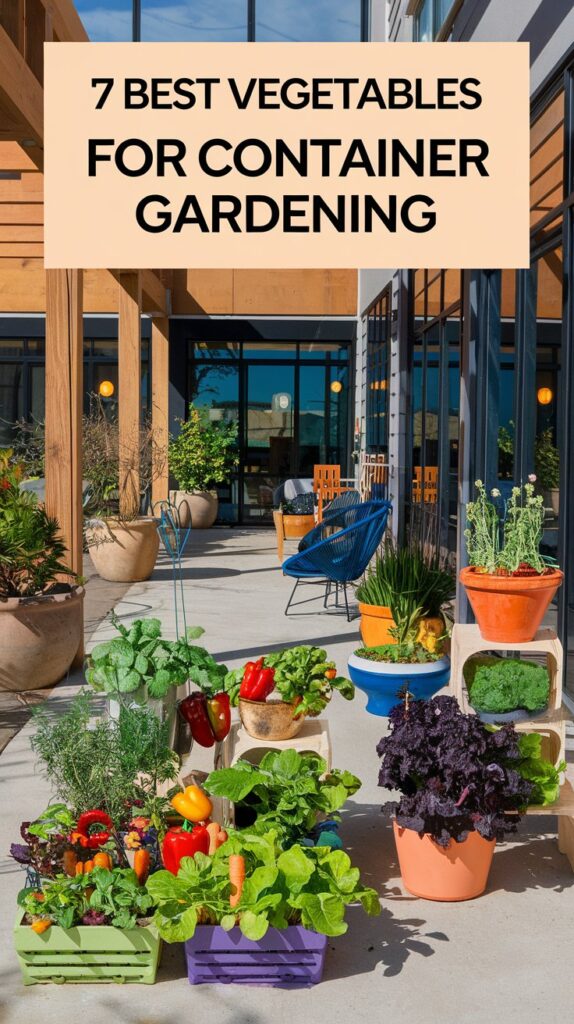7 Best Vegetables for Container Gardening
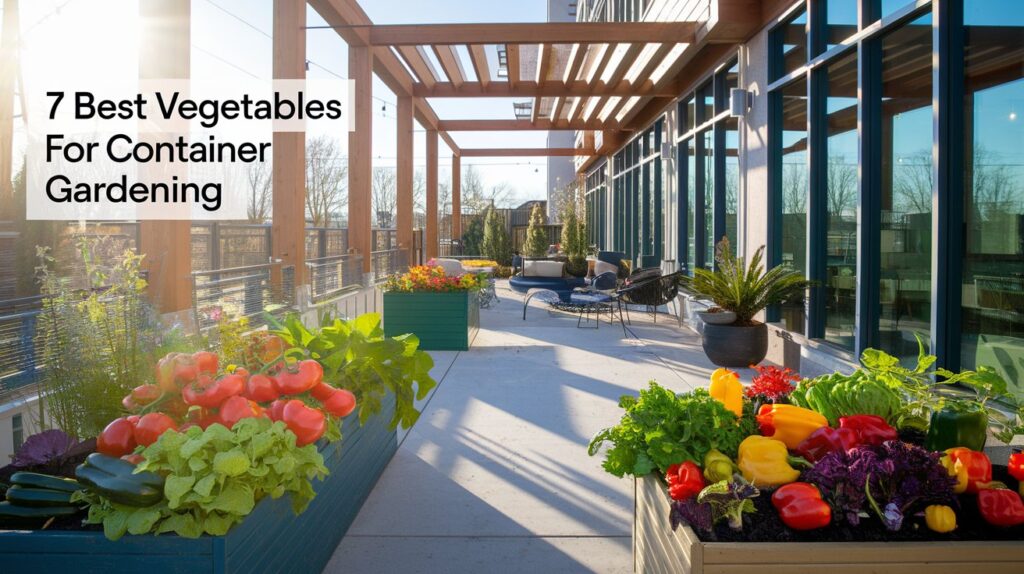
Introduction
Welcome to your ultimate guide on container gardening—your very own urban farm in a pot! Whether you’re short on space or just love the charm of gardening on a balcony, this guide will show you the 7 best vegetables for container gardening. Get ready to transform your outdoor nook into a flourishing veggie haven. By the end, you’ll have actionable tips to start growing these veggies and a vivid picture of your future garden oasis.
What You Might Need
Before we dig in, here’s a quick list of essentials to set up your container garden:
- Containers: Choose pots with good drainage.
- Potting Soil: A high-quality mix that suits vegetables.
- Fertilizer: Organic options work best.
- Watering Can or Hose: For regular hydration.
- Garden Tools: A trowel and pruners for maintenance.
- Trellis/Stakes: For climbing varieties (if needed).
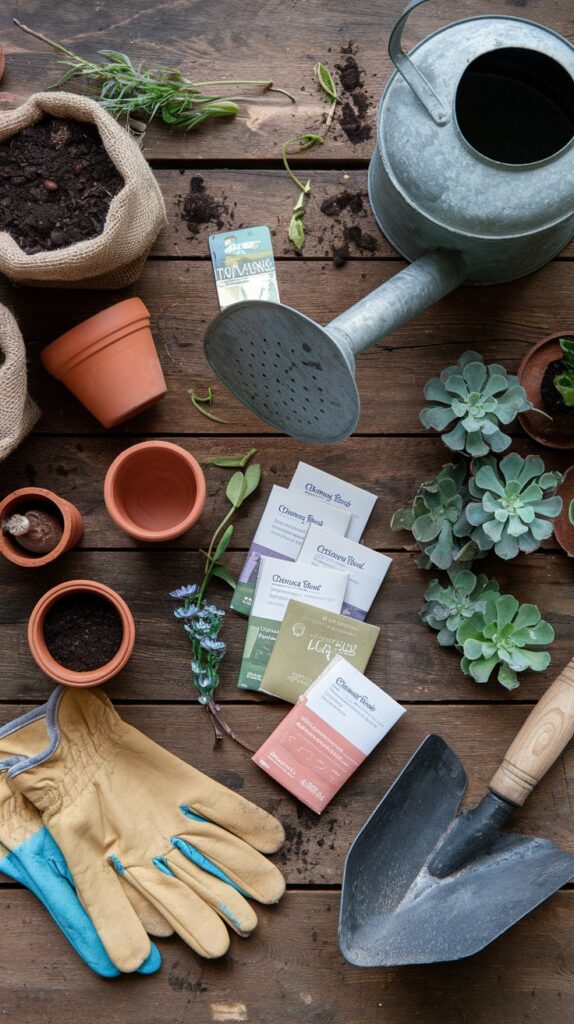
1. Cherry Tomatoes: The Juicy Starter
Why Cherry Tomatoes?
Cherry tomatoes are a container gardening superstar thanks to their compact size and bountiful harvest. They thrive in smaller spaces and add a pop of color and flavor to salads, pastas, and snacking.
Step-by-Step Tips:
- Select a Compact Variety: Opt for bush or patio varieties designed for small spaces.
- Use a Deep Container: Ensure your pot is at least 12 inches deep.
- Sunlight & Water: Place in full sun and water regularly to keep the soil moist.
- Support Growth: Use a small stake or cage if needed.
Actionable Tip: Rotate your container every few days to ensure even sun exposure.
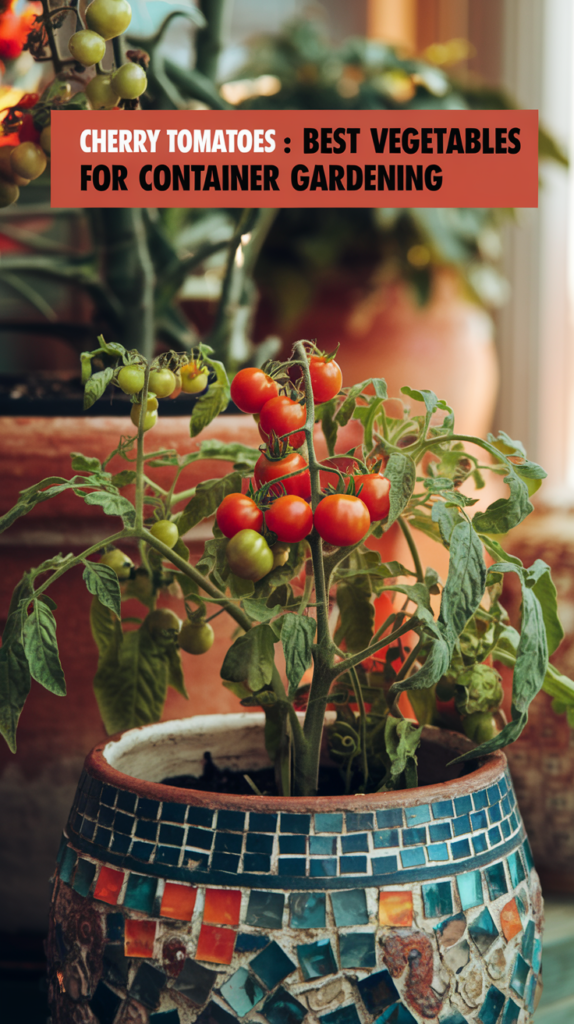
A close-up of a cherry tomato plant in a decorative container with bright red fruits, set against a sunlit background.
2. Lettuce: The Crisp Classic
Why Lettuce?
Lettuce is a fast-growing, low-maintenance vegetable perfect for container gardening. Its crisp, refreshing leaves make it a staple for salads and sandwiches.
Step-by-Step Tips:
- Choose the Right Variety: Loose-leaf varieties are ideal for container growth.
- Plant Shallow Roots: Use a wide, shallow container.
- Regular Watering: Keep the soil consistently moist, but avoid overwatering.
- Harvest Early: Snip leaves as needed to encourage continual growth.
Actionable Tip: Use a light mulch on top to retain moisture and reduce weed competition.
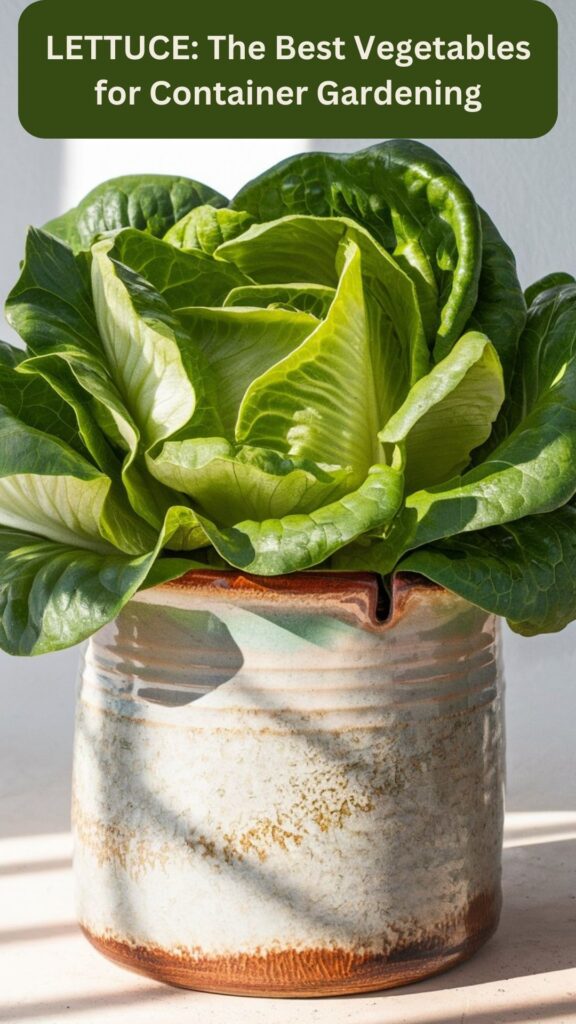
3. Spinach: The Nutrient-Packed Powerhouse
Why Spinach?
Spinach is a nutrient-dense leafy green that grows quickly in containers. Its tender leaves add a burst of flavor and health benefits to your meals.
Step-by-Step Tips:
- Opt for Baby Spinach: These varieties are perfect for container gardening.
- Use a Container with Good Drainage: Spinach prefers well-draining soil.
- Cooler Conditions: Place in a spot that gets partial sunlight to avoid bolting.
- Thin Out Plants: Ensure proper spacing for air circulation and growth.
Actionable Tip: Add a liquid fertilizer every few weeks to boost growth and maintain nutrient levels.
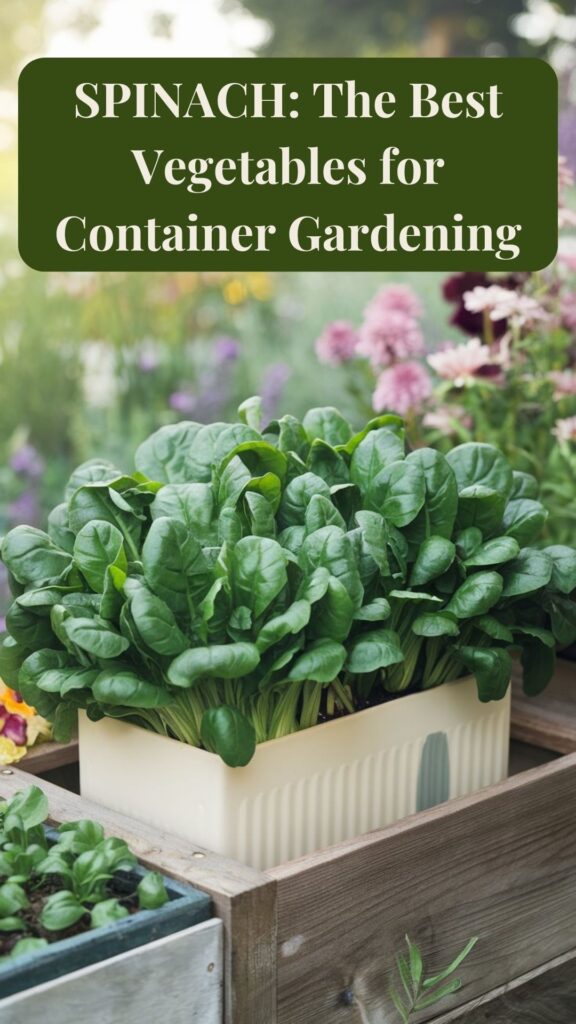
A neatly arranged container of spinach, showcasing the lush, deep green leaves against a backdrop of a softly lit garden scene.
4. Bell Peppers: Colorful & Flavorful
Why Bell Peppers?
Bell peppers are not only colorful but also pack a sweet crunch that elevates any dish. Their compact growth habit makes them ideal for container gardens.
Step-by-Step Tips:
- Choose Compact Varieties: Look for dwarf or mini bell pepper varieties.
- Ensure Deep Containers: A pot at least 12 inches deep works best.
- Full Sun: Place them where they can soak up 6-8 hours of sunlight daily.
- Regular Feeding: Use a balanced fertilizer to support fruit production.
Actionable Tip: Remove any yellowing leaves promptly to encourage healthy growth and prevent disease spread.
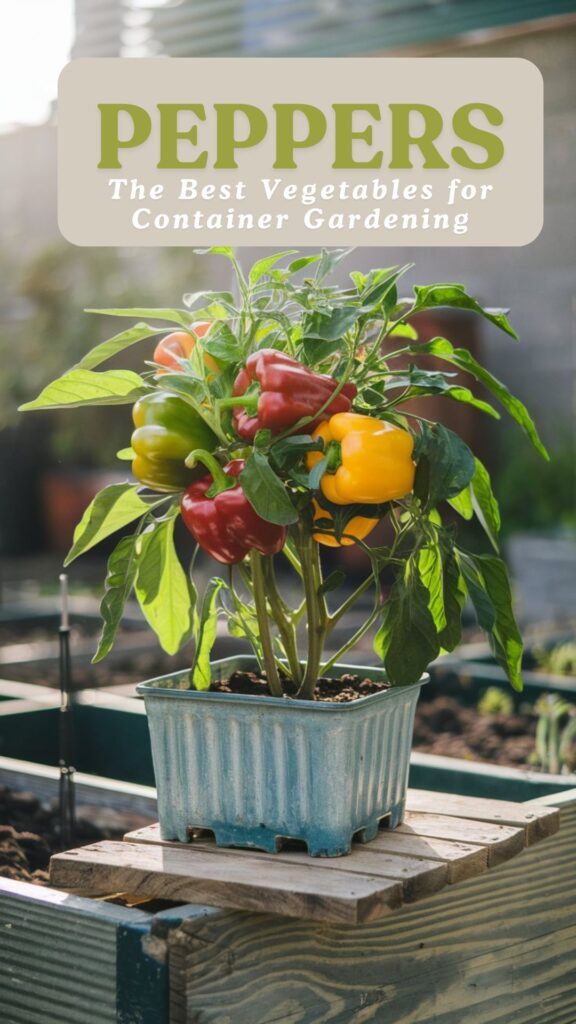
A vibrant display of bell peppers in a container, set against a sunlit background that emphasizes their rich, natural colors.
5. Radishes: Quick & Easy Bites
Why Radishes?
Radishes are one of the fastest-growing vegetables, making them a fun and rewarding choice for container gardening. Their spicy, crunchy roots are perfect for salads and garnishes.
Step-by-Step Tips:
- Select a Compact Variety: Choose varieties known for their small, bite-sized roots.
- Shallow Containers Work Best: Use a container no deeper than 6-8 inches.
- Consistent Moisture: Keep the soil evenly moist for rapid growth.
- Thin Out as Needed: Ensure proper spacing to avoid overcrowding.
Actionable Tip: Plant radishes in succession to enjoy a continuous harvest throughout the growing season.
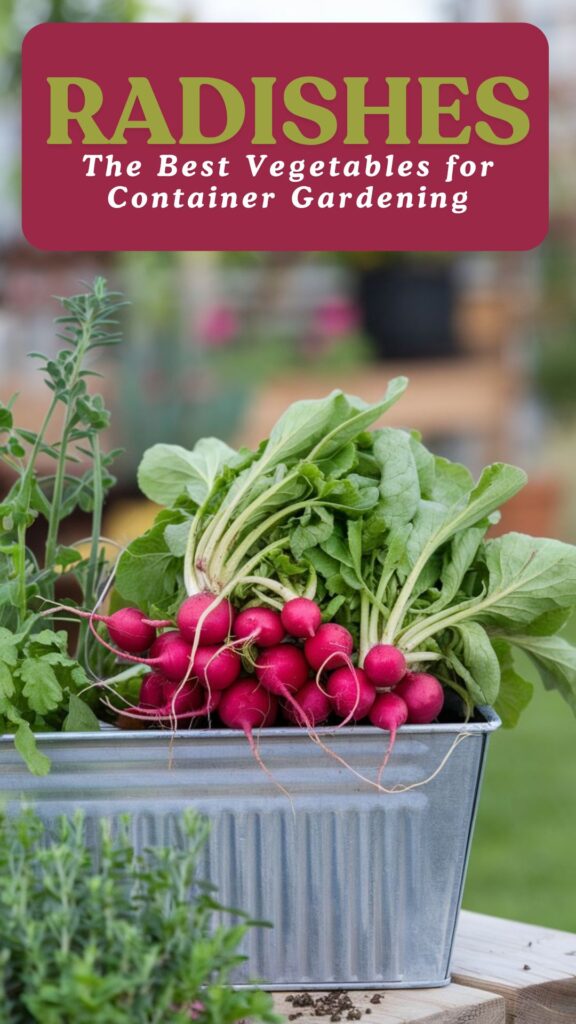
A container of radishes with vibrant red roots contrasting beautifully against fresh green foliage, exuding a playful, garden-fresh vibe.
6. Bush Beans: The Protein Punch
Why Bush Beans?
Bush beans are a container-friendly variety of legumes that produce a generous harvest in compact spaces. They add a nutritious protein boost to your meals and are a delight to grow.
Step-by-Step Tips:
- Compact Bush Varieties: Opt for bush beans rather than pole beans.
- Use a Deep, Wide Container: Ensure ample room for roots and pods.
- Sun and Support: Place in full sun and provide minimal support if needed.
- Regular Harvesting: Pick the beans as they mature to encourage continuous production.
Actionable Tip: Rotate your bean plants every few days to ensure even growth and prevent leaning.
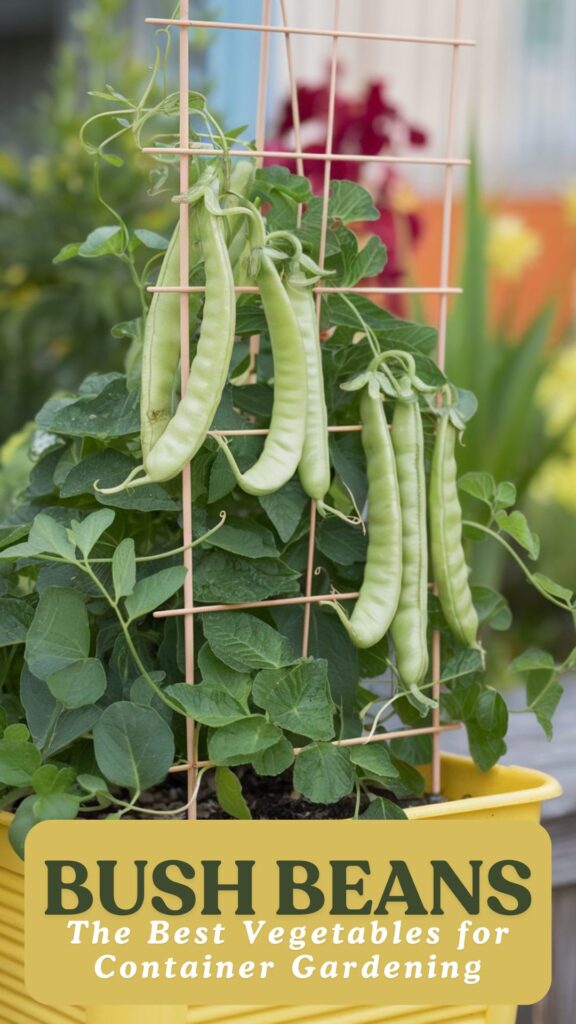
A bright, cheerful container overflowing with bush beans, each pod glistening with freshness against a vibrant garden backdrop.
7. Carrots: Crunchy Delights in Miniature
Why Carrots?
Carrots aren’t just for the backyard—they can thrive in containers too! Opt for shorter, round varieties that are perfect for container life, providing a sweet and crunchy addition to your dishes.
Step-by-Step Tips:
- Choose Baby Carrots: Select varieties bred for container gardening.
- Deep Container with Loose Soil: Ensure your container is deep enough and filled with well-draining, loose soil.
- Thin Plantings: Space the seeds appropriately to allow room for root development.
- Consistent Watering: Maintain moisture without waterlogging the soil.
Actionable Tip: Use a fertilizer high in potassium to promote strong root development and vibrant color.
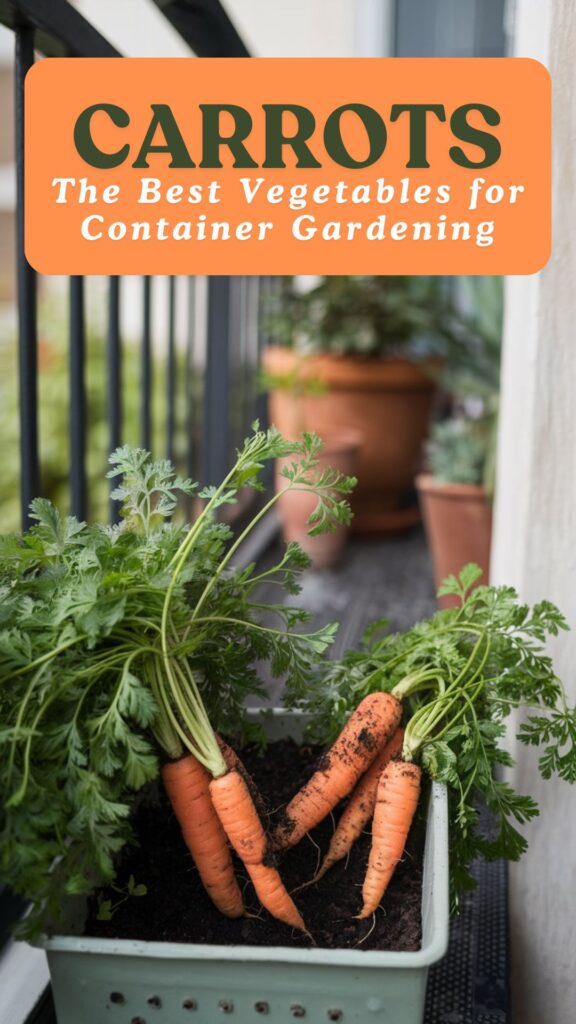
A beautifully arranged container of baby carrots, showcasing the bright orange roots contrasting with fresh green foliage, ideal for inspiring your next healthy snack.
